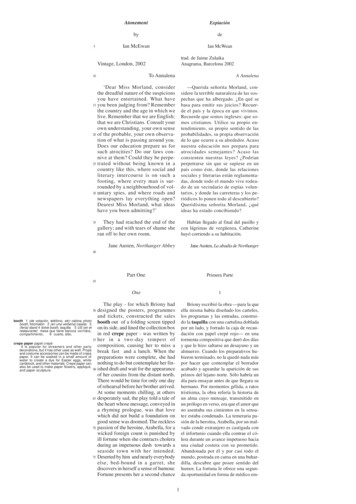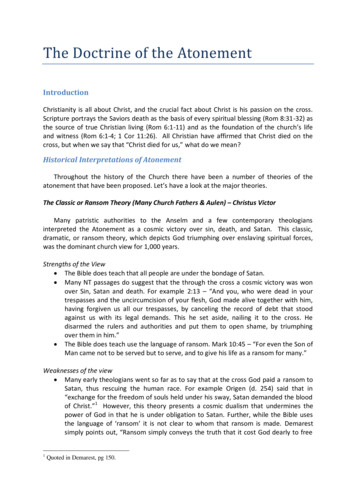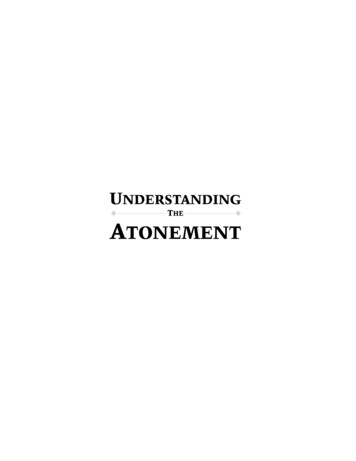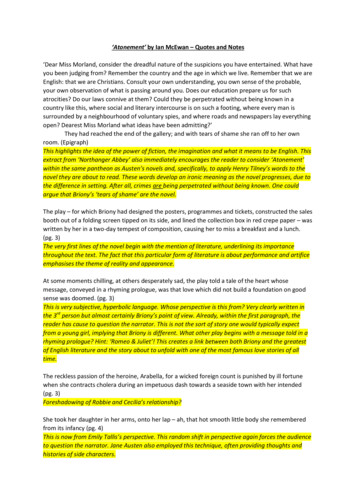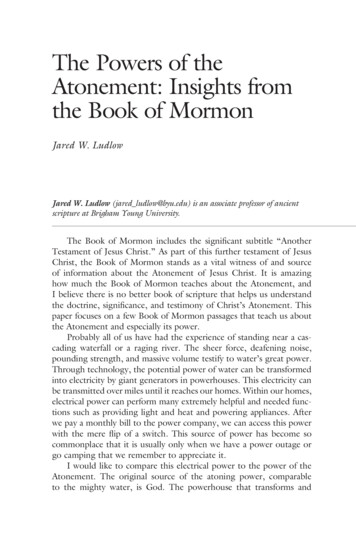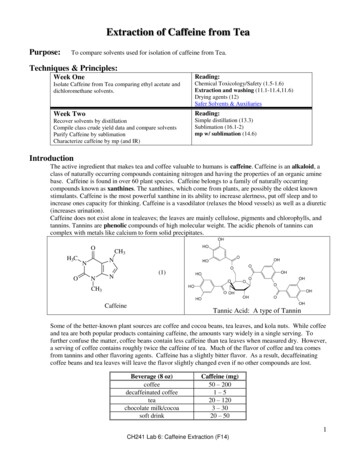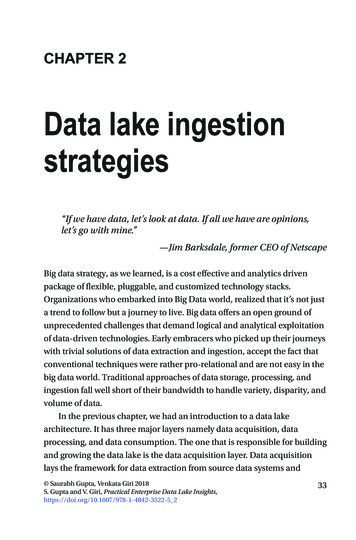
Transcription
iptthecrsoting soh ATONEMENTScreenplay byCHRISTOPHER HAMPTONbased on the novel byIAN MCEWANintroduction byCHRISTOPHER HAMPTONA Newmarket Shooting Scr ipt Ser ies BookN E W M A R K E T P R E S S N E W YO R K
ninductiorotn the strange days towards the end of 2001, I was in Thailand preparing togo location-scouting for a film I’d co-written and was intending to direct,based on a novel by Eric Ambler. I’d brought with me Ian McEwan’s novelAtonement: I always look forward to his books, and this longish novel, I thought,might be the ideal distraction from the gathering conviction that a piecelike Ambler’s The Night-Comers—which deals with the quiet, deadly powerstruggle in Indonesia between moderate and fundamentalist Moslems—would,in the current climate, never even reach the starting gate. So, sitting by thehotel pool, far from the prewar English country landscapes so vividlyevoked in the novel, I felt myself sinking into the world of Briony Tallis, soentranced that I could scarcely bring myself to move when the fierce sunshifted and fell across my feet or shoulders.By the time I came back to England, I was convinced that, complex andinteriorized as it was, the novel could still be the basis of a powerful film. Icontacted my agent, who told me that several writers were already interested in the project and that Ian, who had retained a position as ExecutiveProducer, had reserved the right to interview, vet, or otherwise audition thecandidates. A dinner was arranged with Richard Eyre, an old friend andcolleague of both Ian and myself; Robert Fox, the producer; and Ian. I gavea somewhat halting (and, in retrospect, totally inaccurate) account of theapproach I was thinking of adopting and, in due course, to my great excitement, was offered the job.Over the next couple of years, I produced three or four drafts, each ofwhich was analysed and dissected in meetings at Richard’s house, before beingdiscussed in considerable detail with Ian. In the version that emerged, theIv
story was framed by the return of Briony Tallis, celebrating her seventyseventh birthday, to the country hotel into which her childhood home hadbeen converted; the voice of the old writer, whose actions one blazingsummer’s day in 1935 had profoundly affected, not to say blighted, herown life and the lives of those most precious to her, was heard from timeto time, reflecting on the implications of this or that event, while she herself was glimpsed occasionally like a ghost from the future; and the secondand third sections of the novel (the flight to Dunkirk and Briony’s wartimeservice in St. Thomas’s Hospital), which happen more or less simultaneouslyin time, were rearranged and interwoven. The intention was always to remainas faithful to the spirit of the novel as possible—I’m always baffled by thewidespread notion that when a high price has been paid for a much-lovedplay or novel, the first thing to do is to set about it with a hacksaw—and totranslate it into a calm and measured overview of a series of irredeemablecatastrophes, somewhat in the manner of Harold Pinter’s spare and heartbreaking account of L. P. Hartley’s The Go-Between.Time drifted on, and a familiar anguish began to make itself felt: thefear that for one or another unfathomable reason, the film might in the endnot be made. A pretty expensive art film about a writer and her very particular sufferings and temptations might well seem a hard sell, and eventuallyRichard Eyre moved away in the direction of a sure thing: his exquisitely actedand entertainingly malevolent version of Notes on a Scandal. It seemed tome as if a whale I’d been riding for a number of years was about to disappear into the deep: and then I was called into the Working Title offices tomeet Joe Wright.Joe wasted no time in uttering one of those formulae that strike dreadinto a screenwriter’s heart (others might include, “This is a really good firstdraft” or “Who exactly are we supposed to be rooting for?”). He said: “I’dlike to start from scratch.” Furthermore, he meant it. But the good newswas he knew what he wanted: to bring the screenplay back even closer tothe form of the novel, and he had good, specific ideas of how this might bedone. For him the first move was to kick away the crutches: the explanatoryvoice-overs, the framing device, the linearity of narrative. This would meanthat the story would have to be told primarily in images and that the actors’thoughts would have to be readable on their faces rather than audible on thevi
sound track; and that, echoing the bold strategy of the book, we would bedealing in big, self-contained chunks of narrative, where the focus would shiftunapologetically from one character to another.This had one major unforeseen advantage: the twenty-minute gap betweenseeing Briony at thirteen and Briony at eighteen made it far easier to thinkof casting two separate actors, an idea that had not really occurred to us before,when our structure had appeared to insist on a teenage actor capable ofaging up and down. The reclaiming of the first half of the story, so that itcould be seen through the eyes of a genuine child, made an immeasurable difference to the understanding of Briony’s crime, if that is what it is. And theholding in reserve of old Briony, who now appears only in a relatively briefepilogue, means that the viewer of the film, no longer alerted by premonitory hints, can suffer the same dislocating shocks at the end as the reader ofthe novel.The entire process was long and arduous: a couple more full drafts, followed by constant revision of one section or another, until finally, at theend of 2005, Joe and I went to spend two weeks on a property not far fromFlorence, belonging to Susa Gelpke, an extremely sympathetic and hospitablefriend of Joe’s, out of which came a final draft which proved to me thetruth of something I had often heard asserted: nothing can be more timeconsuming or effortful than the work required to make a piece of writingseem simple, lucid, and effortless.A word, finally, about the passage we always referred to as “the Dunkirksection.” Formally troublesome in itself, it was also the most serious victimof the budget restrictions that had, quite sensibly, been applied to thisadventurous project. There were to be no columns of refugees strafed byGerman Stukas, no Panzers rolling northwards, no carpet-bombing of theretreating armies. Instead, illustrating another old adage about the creativityunleashed by imposed limits, there would be three soldiers tramping norththrough a phantasmagorical landscape of literal death and dreams and memories of many other kinds of death. The teeming chaos of Dunkirk had tobe portrayed in a kind of composite scene, brilliantly organized by Joe intoa single, spectacularly executed Steadicam shot. Not exactly a case of lessmeaning more, although it meant that the thousand extras were required onlyfor one day, it gave a genuine sense of sweep and size and a true feeling ofvii
the sorrow and pity of war. Here and elsewhere I can say, almost as anobjective bystander, though with great pleasure and pride, that the film foundits own compelling way of conveying the novel’s particularly eloquent balance of the epic and the intimate.A word about the text itself: what you have in your hands is a transcription, made after the event, of the finished film. The dozens of scenes thatfell by the wayside like exhausted soldiers on their way to Dunkirk had theirplace in the overall scheme of things, but to include any or all of themmight seem like a criticism of the completed object: the film Atonement, ofwhich this is the written record.—Christopher HamptonDecember 2007viii
ATONEMENTScreenplay byChristopher HamptonBased on the novel byIan McEwan
CREDIT SEQUENCEThe SOUND of a typewriter, irregularly struck, now fluent, nowcreating an urgent rhythm that forms the percussive element ofthe opening score.A doll’s house, in the form of the Tallis house, an enormousVictorian Gothic pile. The CAMERA moves from room to room, fromthe nursery and spare bedrooms on the second floor, to the mainbedrooms on the first floor, where puppet versions of mother,daughter, son and baby sister are neatly ordered, to the groundfloor with its library, drawing room, dining room and kitchen.Finally the CAMERA moves to the hall through which a younggardener puppet wheels a wheelbarrow.The CAMERA PULLS BACK through a downstairs window to reveal thewhole impressive facade.A CAPTION:INT.ENGLAND, 1935BRIONY’S BEDROOM.TALLIS HOUSE.DAY.The doll’s house is kept in BRIONY’s bedroom. At 13, she’s theyoungest of the family, an intense-looking child with a wilfultemperament. Her room is meticulously tidy, with model animalsarranged with military precision, all facing in the samedirection, two by two, as if queuing for the Ark.BRIONY is typing out a version of her just-completed first play,a battered copy of the Oxford English Dictionary open on thedesk. As the CAMERA arrives at her manuscript, she is typing,with a confident flourish, the words THE END. Having done this,she leans forward to pull the page from the typewriter and addit to a small pile (the play is no more than 8 pages) ofmanuscript, the cover page of which reads THE TRIALS OF ARABELLAby Briony Tallis. It’s still early in the morning, but the beadsof sweat BRIONY brushes from her forehead tell us that the dayis already exceptionally hot.INT.LANDING, STAIRCASE AND HALLWAY.DAY.Holding her manuscript, BRIONY hurries along the landing, past adoor opening on to a spare bedroom. Inside, a HOUSEMAID issinging as she makes up twin beds. BRIONY descends the servants’staircase, which leads to a black-and-white tiled hallway. Shedoesn’t even glance into the library, a vast, gloomy roomglimpsed through its open door, but turns to move towards theback of the house.
2.INT.KITCHEN.DAYBRIONY glances into the empty dining room and passes through thescullery into the huge old kitchen, where GRACE TURNER, thehousekeeper, sits at one end of the kitchen table polishing thesilver, while BETTY, the cook, is supervising two or threeKITCHEN-MAIDS, who are peeling mounds of potatoes, scouring oventrays, etc.BRIONYI’ve finished my play!GRACEWell done, dear.BRIONYHave you seen Mummy?GRACEI expect she’ll be in the drawingroom.BETTYI hope you’re not going to be gettingunder our feet today, Miss Briony,we’ve got a dinner for ten to prepare.BRIONY’s already on her way out of the room, not listening.INT. HALLWAY. DAY.BRIONY hurries back down the hall, reaches the drawing room doorand is about to enter when she sees ROBBIE TURNER, an impressivelooking young man of 24 in working clothes, outside an open doorleading to the formal gardens. He’s putting on a pair of muddygardening boots.ROBBIEHello pal. I hear you’re putting on aplay.BRIONYWho told you?ROBBIEJungle drums.BRIONYWill you come and see it?ROBBIEI’m not sure that would be quite.
3.He breaks off, quickly finds another tack and stands.ROBBIEWhy don’t you let me read it? You usedto make me beautiful bound copies ofall your stories.BRIONYI still want you to come.ROBBIELet’s see.BRIONY enters the drawing room. Inside the morning news plays onthe wireless.BRIONYMummy, I need you!She closes the door behind her.INT.DRAWING ROOM.DAY.The drawing room is an enormous corner room looking out onto aterrace. EMILY TALLIS, BRIONY’s mother, a slightly faded womanwith pale skin and raw nerves, finishes reading BRIONY’smanuscript. The radio has been turned off. BRIONY hovers aboveher, anxious and excited. EMILY looks up and smiles warmly atBRIONY.EMILYStupendous! It’s stupendous, darling!Your first play!BRIONYDo you think Leon will like it?EMILYWell of course he will. ‘The Trials ofArabella’ by Briony Tallis.EXT.TALLIS HOUSE.GARDENS.DAY.It’s no later than 10am, but the sun is already high and blazingdown on the monumental facade of the Tallis house, recognisablefrom its miniature version seen earlier. Lying on one of therolling lawns is CECILIA TALLIS, BRIONY’s sister, a beautiful,restless-looking girl of 23, who is making a desultory attemptto read a fat edition of Richardson’s Clarissa. She turns back apage to re-read something, then sighs, rolls on to her back andshuts her eyes against the sun. BRIONY is lying a few feet away.
4.BRIONYCee?CECILIAYes.BRIONYWhat do you think it would feel liketo be someone else?CECILIACooler, I should hope.Pause.BRIONYI’m worried about the play.CECILIAI’m sure it’s a masterpiece.BRIONYBut we only have the afternoon torehearse. What if the twins can’t act?CECILIAYou have to be nice to them. Think howyou’d feel if your mother had run offwith Mr. What’s-His-Name who reads thenews on the wireless.BRIONYPerhaps I should have written Leon astory. If you write a story, you onlyhave to say the word ‘castle’ and youcan see the towers and the woods andthe village below. But in a playit’s. it all depends on otherpeople.CECILIAMm.BRIONY rolls over. Some way off, ROBBIE TURNER pushes awheelbarrow up to a flower bed and parks it.BRIONYCee?CECILIAYes.
5.BRIONYWhy don’t you talk to Robbie any more?CECILIAI do. We just move in differentcircles, that’s all.Down by the flower bed, ROBBIE glances across at CECILIA andBRIONY. But he’s very focused on his immediate task which is theplanting of a row of cuttings from the greenhouse. He wipes thesweat off his forehead and begins to dig with a trowel.INT.NURSERY.DAY.Rehearsals are taking place in a now disused room on the topfloor, the former nursery, occupying the front corner of thehouse. BRIONY has wedged herself into an old high chair andlooks down at her red-headed cousins: LOLA QUINCEY, 15, and hertwin 9 year-old brothers, PIERROT and JACKSON. They’re allclutching handwritten copies of BRIONY’s play.JACKSONDo we have to do a play?PIERROTWhy do we have to?BRIONYIt’s to celebrate my brother Leon’svisit.PIERROTI hate plays.JACKSONSo do I.BRIONYHow can you hate plays?PIERROTIt’s just showing off.LOLA crosses her legs, reveali
ATONEMENT t A Newmarket Shooting Script Series Book NEWMARKET PRESS NEW YORK. v In the strange days towards the end of 2001, I was in Thailand preparing to go location-scouting for a film I’d co-written and was intending to direct, based on a novel by Eric Ambler. I’d brought with me Ian McEwan’s novel Atonement: I always look forw ard to his books, and this long ish novel, I .
